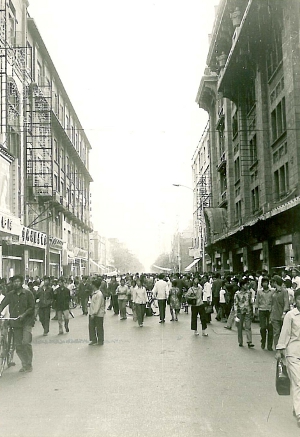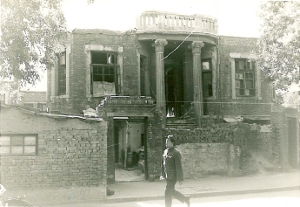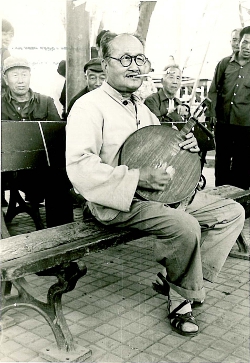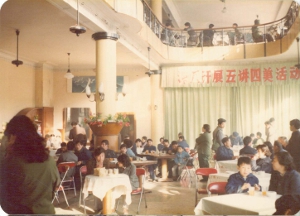|
||||||||||
|
FEATURESDraft Sketches from a Tientsin Journal (1980-82) 津門雜記外編初稿by An Old Concessionaire 租界遺老Preface 序Thirty years ago China was emerging from the Cultural Revolution. These notes, jotted down at the time, have somehow never been thrown away. Some of them may perhaps be worth preserving as records and memories of a China that now seems almost as far in the past as the Peking of the 1930s and 40s seemed then.—John Minford  Fig.1 On the train from Canton. Canton: 沖 The Tao of the ToiletBoarding the train to Canton, our first trip into 'real' China, not the China of Arthur Waley and Ezra Pound. The long journey north to Tientsin. So much to learn. A mile over the border, first epiphany in the rolling toilet: inscribed in a rough hand on the cistern the unmistakeable character chong 沖 (or more probably 冲), anyway whichever it was, surely a premonition that Taoism had survived the Great Proletarian Cultural Revolution. As we'd been taught it:
Or again: 大盈若沖其用不窮。 The Great Fullness Bubbles, (Like champagne): Use it, decant it, It can never be exhausted. The British Maoist Sage Joseph Needham had preached to us in the late 1960s the gospel of the Great Helmsman (Maozi), who was finally achieving what his forefathers, those (according to Needham and Hou Wailu) hoary proto-socialists Laozi and Zhuangzi, had only ever been able to dream of! The remaking of man in a Taoist image. Toilets and all. I had not believed him. But here is living proof. The Tao still bubbling forth, in the toilet... It is weeks before they tell me it just means ‘pull the chain’. 便後沖水/便后冲水 So much to unlearn.  Fig.2 Canton street scene, 1980. That very first evening, struggling down the unlit streets of Canton, against a black wave of shoppers, vainly trying not to be crushed by the oncoming hordes of heavy bicycles. First intimations of darkness. China not Cathay. The apparition of these faces in the crowd; Petals on a wet, black bough.First of many epic train journeys crisscrossing China, in crowded compartments, hearing hastily confided stories from anonymous strangers who descend at the next stop. Soldiers wounded stupidly in the border war with Vietnam, left untended to rot. Disenchanted teachers. Mad poets. Party members caught in adultery. PekingArriving in Peking, leaving behind the Friendship Hotel, and its cliché of confused, huddled foreigners, stranded in their Middle Kingdom ghetto, recovering from their meaninglessly overwhelming, their sanitised trip to the Forbidden City and the Ming Tombs. Summoned to the apartment of Yang Xianyi and Gladys, the original of Christopher Koch's old Professor, ‘Liu Meng’, to be warmly embraced by their circle of friends. Unable to decipher their smiles. Taken aside by Xianyi in fatherly mode, who confides that in China old talismans still have potency. If ever in serious trouble, mention the Dream of the Red Chamber. TientsinThe city is still in post-Earthquake mode. Rubble. Makeshift dwellings on the pavements. Long lumbering articulated buses crawling through the streets. Acrid smell in the air from the paper factory. The city seems to function on inertia. Welcomed by the elderly university president, graduate of Peking University, bearing his yellowing copy of the complete works of Hu Shi 胡適文存, overly eager to offload them. One glance reveals how painstakingly he has inked out the offending names (Chen Duxiu 陳獨秀 et al.) These books are safer in the hands of a true-blue bourgeois intellectual. British Concession Fig.3 Derelict house in the British concession. The evening we arrive the city is wrapped in a deathly hush. All of Tientsin is gathered round a TV set, watching the biggest soap of the decade: the Trial of the Gang of Four, Jiang Qing's last star role. Our cortege drives down Racecourse Road, 馬場道, melted remains of thick lumps of snot, winter-frozen at nose height on the pollarded trees. This was the main thoroughfare of the old British Concession. Side streets all have new names, in place of what had been Oxford Road, Victoria Road, Hereford Road... Down one such road, now Chengde Dao 承德道, are the once-elegant mansions of former warlords, who fled to the relative safety (and superior sanitation) of the British Concession. One such mansion is now the No. 1 Kindergarten... Others are still inhabited by the fearful descendants of Yuan Shikai, Zhang Zuolin, Cao Kun, Zhang Xun. On brave evenings, they throw great disco parties, with cigarettes and music from HK, blue class-neutral uniforms hanging on hooks in the front hall in case of a knock at the door, furtive introductions to the current protectors of the city's cigarette and prostitution rackets.... Other streets in the Concession are haunted by the ghosts of former British consuls, Herbert Giles, Lionel Hopkins, brother of Gerard Manley, early decipherer of Oracle Bones.  Fig.4 Chapel in the old Jesuit college.  Fig.5 Choirboys of the old Jesuit college. Institute of Foreign LanguagesThe Institute itself is housed in a rather grand old lady of a building, the colonial-style Institut des Hautes Études Commerciales et Industrielles, founded in the late-nineteenth century by French Jesuit fathers. Here the great Teilhard de Chardin taught, meditated, and stored his precious objects. The old Maison des Pères, where the Fathers once prayed and slept, now houses the Surveillance, the waishizu 外事组. Next to it the ugly, concrete, purpose-built Foreign Experts Hostel 專家樓, bugged and guarded. The old Chapel is used for screening the occasional movie. In the old Library, the Poetry of Henry Vaughan is marked Read with Caution, For Reference Only. This was the school where Brian Power, born in 1918, studied as a boy. This was the chapel where he served as an altar boy, where his mother played the organ. Brian Power's memoir of Tientsin in the early twentieth century, Ford of Heaven, is a masterpiece, possibly the finest evocation of the strange hybrid world of the Treaty Ports, a lyrical work, ‘its centre filled with the smells and memories of a quixotic boyhood: Pierre Teilhard de Chardin coming for afternoon tea long before he became the most famous Jesuit priest of the 20th century, Chinese storytellers reciting ancient tales in the street, market stalls smelling of cabbage stalks, aniseed, garlic, soya and oils, and, during a visit to the house of a Chinese school-friend, the memorable sighting of a line of 12 young girls with bound feet, all of them dressed in bright pink gowns buttoned up to the chin. “My father's concubines,” his friend announced. “They are going to their supper.” Most foreign accounts of life in China are characterised by a complete absence of Chinese. Power's was an exception’ (from Power’s obituary in the Daily Telegraph, 22 June 2008). To the end, as the Telegraph obituary drily notes, Power remained wonderfully true to his very individual perception of China. ‘Shortly before he died he reported with glee to his stepson of the discovery in a remote cave in the Taklamakan desert in northern China of a tribe of mysterious mummies, or Chinese Celts. They were surrounded by Celtic armour and had red hair. They even wore kilts.’ Purple Bamboo GroveBefore the Foreign Languages Institute (part of the Soviet-style tertiary education structure of the 50s), before the British, before the Jesuits, this area had been the Purple Bamboo Grove 紫竹林. A student takes me secretly to an elderly master of the art of dianxue 點穴, who has been banned from the city, exiled to the North-East for practising his superstitious arts, but who returns under cover of night at regular intervals to heal his devoted followers. The old man purports to heal me, attacks me in a darkened room. Once I know my way around a bit, I explore the old city and the raffish area around the old Southern Market, idly watching street entertainers. One old bald-headed performer ties himself up in a length of copper wire, before a large crowd, and protests at our presence. Foreigners are not entitled to view this essential component of the guocui 國粹. Another old man gathers an even larger crowd outside the city's only good tea shop, exclaiming as we emerge with two-year-old blonde, bonny Daniel 大牛: ‘外國小孩兒多漂亮!一長大就難看了!’  Fig. 6 Yao Nainai By an extraordinary stroke of fortune, I make contact with Little Stone 小石頭, a descendant of the Manchu Bannerman Linqing 麟慶 [Lincing, see New Scholarship in this issue], and acquire a priceless original edition of Tracks in the Snow 鴻雪因緣圖記. Only one thousand copies of this were ever printed, and the woodblocks were destroyed during the Taiping Rebellion. This is truly part of some long standing 因緣. In the old Confucian Temple 文廟 rarely open to the public, I stumble across a new reprint of A Tientsin Sketchbook 津門雜記, 光緒十年 (1884) by Zhang Tao 張燾, (zi 赤山), praised in the city Tourist Board's official Tianjin Guide 天津指南 of 1983 (p.15) as a ‘comprehensive record of local customs and ways’ 記天津風土人情甚詳, written in a ‘light and enjoyable style’ 文字輕鬆可喜. It is both. In the second juan, there is a candid section devoted to the brothels 妓館 of Tientsin, detailing the location of the various pleasure quarters, some more salubrious than others, describing the wide variety of charms available, 燕廋環肥, and warning of the dangers of getting a ‘touch of the clap’ 染毒. The cheapest of all were the squalid establishments beyond the Purple Bamboo Grove, outside the British and French Concessions. Within the Grove itself were the Cantonese ladies of the night 廣東娼, in their outlandish attire, many on the arm of a (presumably undiscriminating) foreigner, or of a visiting merchant from Canton, very few of them really attractive (to a Northern Chinese eye) 絕少出色者 . The delightful little book is rich in such details. In the third juan, it describes the Race Course, and the French and British concessions stretching from south of the Purple Bamboo Grove down to the old wharf used by the Chinese shipping company China Merchants, 招商局.  Fig.7 Cover of the original Tientsin Sketchbook, 1884.
Fig.7 Cover of the original Tientsin Sketchbook, 1884.

 Figs.8 & 9 Opera enthusiasts in the People's Park.
Figs.8 & 9 Opera enthusiasts in the People's Park.
In the Institute library, I stumble across Rasmussen's wonderful Tientsin: An Illustrated Outline History (Tientsin Press, 1925). No one has borrowed it for decades. It is now a very rare book. Rasmussen's fascinating historical excursus: Tientsin, Marco Polo's Tiensing, the Citta Celeste. First fortified in Ming dynasty, 天津衛, garrison town, when capital moved to Peking; Ford leading to the City of the Son of Heaven. 小直沽 was an old name. (p. 8) 'The layout of the original concession was partly the handiwork of General Gordon. Terms of the Crown Lease were: ''Leases of lots situated, lying and being within the boundaries of the land called Tse Chu Lin site at Tientsin aforesaid." (p. 38, footnote)... The site of the British Settlement was a long stretch of vegetable gardens, with here and there a cluster of squalid mud houses to a little west of the present Victoria Road; and thence to the Taku Road, chiefly fields of kaoliang and pools, with a few burial grounds. This rude area (according to Oliphant in 1860, 'the most squalid, impoverished-looking place we had ever been in...) Gordon pencilled out into bund, roads and lots for buildings...' Michie, writing in 1917, called the place 'one of the dirtiest, most repulsive cities in China, the people reputed to be the most turbulent, predatory and wicked race in the Empire... Undiscovered crimes in other cities were generally debited to Tientsin bullies... (. 37)  Fig.10 The French cathedral.  Fig.11 The interior of Kiessling's Coffee Shop. Astor Hotel, No 1 HotelIn 1980, the resident foreign population of Tientsin is estimated at about thirty. Very few places of refuge. At the Astor Hotel one can still order a bowdlerized Beef Pojarsky, half-remembered by an irritable chef from the Soviet days. Down at the old Club, sometimes called the Cadres Club 幹部俱樂部, sometimes the International Club 國際俱樂部, depending on the political mood of the month, one can still play tennis, and frequent the bowling alley. And then there is Kiessling's, once the fashionable café down at 小白樓, now a dirty, noisy, proletarian joint. We dream up a misguided scheme to revive it as a literary salon, drafting in students for readings of James Joyce, cummings, Ezra Pound and Li Bo 李白, doomed to failure during the lead-in to the Campaign to Eliminate Spiritual Pollution 精神污染... The cathedral, constructed in 1917 by French Jesuit missionaries, has been restored and has become newly fashionable with young students who wear crucifixes and rosaries, and hang out outside the west end looking for conversation practice.... It is only 110 years since 1870, the year of the infamous Tientsin Massacre, of the destruction of the Orphanage of the Lazarist Sisters of St Vincent de Paul. ‘The sisters were stripped naked, and, one after the other, in full sight of the remainder, their bodies were ripped open, their eyes gouged out and their breasts cut off. As each one was mutilated the body was hoisted on long spears and thrown into the burning Chapel.’ (Rasmussen, p. 50) The Ghost of Mervyn Peake, Tientsin as the inspiration for GormenghastMervyn Peake attended the Grammar School in the British Concession, riding to it on a donkey... He was one of Kipling's 'twice-born', inhabiting two very different worlds... When he came to write his novels about Titus, many of the furnishings of his mind were Chinese, and he transmuted them into the life of another person. (G. Peter Winnington, Vast Alchemies: The Life and Work of Mervyn Peake, London: Peter Owen, 2000, pp.43-5.)  Fig.12 Mervyn Peake's sketch for Gormenghast. |